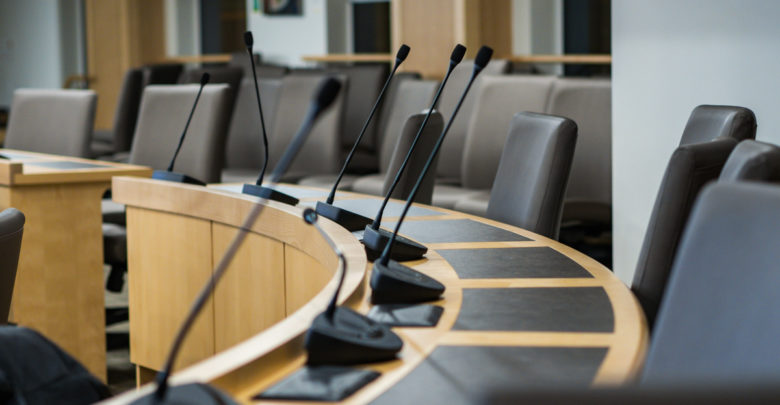Notes from Council: Admin speak on Palestine solidarity encampment removal
Members of university administration answered questions regarding the removal of the encampment on May 11. Council passed the terms of reference for the new Elections Task Force, which will analyze the UASU general election's processes.
 Helen Zhang
Helen Zhang“Notes from Council” is The Gateway’s ongoing series of recaps of noteworthy items from Students’ Council meetings.
At the May 21 University of Alberta Students’ Union (UASU) Students’ Council meeting, university administration addressed concerns about the forceful removal of the Palestine solidarity encampment from Main Quad on May 11.
Deputy Provost (students and enrolment) Melissa Padfield, Vice-provost and Dean of Students Ravina Sanghera, and Vice-provost (equity, diversity, and inclusion) (EDI) Carrie Smith attended the meeting.
Near the end of the meeting, council moved into closed session to discuss the UASU’s response to the encampment removal.
Executive team is “working towards mechanisms” to further discussion about the encampment
During her oral report, UASU President Lisa Glock said the executive team has been working to “respond to and understand the events of the morning of May 11.” Glock added that they’ve been communicating with involved parties, gathering information, and “working towards mechanisms to further that dialogue.”
Vice-president (academic) Layla Alhussainy said she’s began contacting faculty associations and student representatives to discuss goals for the upcoming year. Abdul Abbasi, vice-president (external), said he attended a Canadian Alliance of Student Associations (CASA) conference.
Vice-president (student life) Renson Alva said he’s on the hiring committee for the U of A Sexual Assault Centre’s (UASAC) new assistant dean (community wellness and sexual violence supports). He said efforts are ongoing to get a lactating station installed in the Students’ Union Building (SUB).
Board of Governors (BoG) Representative Adrian Lam did not have any updates. She was “disheartened and shocked” by the encampment removal and will ensure BoG takes it “as seriously as it deserves.”
During open forum, student Brayden Darling said students have lost faith in council’s ability to represent the entire student body over recent weeks.
“I and fellow students have seen a clandestine partiality developed within council, and in particular the president, favouring Students for Justice in Palestine (SJP) [UAlberta],” Darling said. “A non-student-run organization with a record of illegal activity, abuse and harassment of students, and open support of terrorism and violence.”
Darling asked council and the executive team how they can “justify its recent divisive and partisan leadership.”
Abbasi responded that council and the executive team “represent all students [and] are not partisan towards anyone.
“We stand with the right of freedom of speech of every student,” he said.
University administrators speak on encampment removal
Arts councillor Nathan Thiessen directed his question to Padfield, Sanghera, and Smith. He asked how the university can assure that “the freedom of expression and the dignity of undergraduate students” is respected.
Smith said the encampment removal showed “there’s a lot left to learn.” Smith said she’s continuously committed to listening to students directly.
Padfield replied that “actions are a real big part of how we rebuild trust.” She cited peaceful protests and rallies that occurred after the encampment removal.
“I think those actions, coupled with the conversations Smith alluded to, become really, really important pieces of how we continue to preserve free expression as a key value and tenet of this institution.”
Sanghera said she’s “grieving opportunities that are lost,” and that the path forward is a collective one.
The Gateway asked Smith if the EDI office was consulted on having the Edmonton Police Service (EPS) remove the encampment.
Smith said the decision was made at the level of the president and she wasn’t included in those conversations.
“We’re committed to exploring and thinking through each aspect from and equity an safety lens,” Smith said.
Elections Task Force to analyze aspects of the UASU election
Council approved the terms of reference for the UASU Elections Task Force. According to Alhussainy, the 2024 UASU general election identified gaps and highlighted areas for improvement.
The Elections Task Force is meant to address these gaps, according to the terms of reference. Its first task is to analyze all concerns related to the UASU elections, such as relevant bylaws, election administration, voter turnout, and barriers for students. The task force will provide recommendations to council based on its findings.
The terms of reference outlines the task force’s responsibilities and principles, which include impartiality, data-driven analysis, and transparency and accountability.




